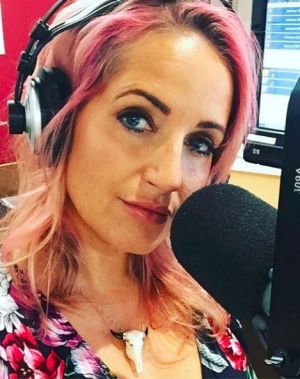Radio presenter Bianca Dye has opened up about the night she was left clutching a knife in terror, huddling in her kitchen after her own experience with domestic violence.
Prompted by the shocking details of Gold Coast mother-of-four Teresa Bradford's murder at the hands of her estranged husband, and hoping it could help people understand, Dye revealed she had been punched and choked by a former partner.

The new voice on Brisbane radio was clearly emotional as she told 97.3FM listeners she broke up with a man in her early 20s, who showed up at her house soon after.
"I was in a situation where I was terrified and I was crying in the kitchen with a knife in my hand because he punched me twice, he threw my Jack Russell up against the wall," she said.
"He cracked a rib and he choked me."
Dye's comments came as calls increased for changes to bail for accused domestic violence perpetrators increased following revelations Ms Bradford's estranged partner, David, had been freed less than three weeks before he killed her and took his own life.
Anti-violence campaigner Rosie Batty, whose husband abused her for years before killing their son with a cricket bat, said judges and magistrates needed to be better educated about the danger victims faced after seeking legal help.
"It escalates - it always does - the danger that they're in," the 2015 Australian of the Year said.

"And this is what people do not understand. That's the time when a woman is at her most vulnerable and in danger of significant harm.
"They've started to take matters into their own hands, and it changes the power dynamics (in abusive relationships)."

Ms Dye never pressed charges against her former partner and said she still didn't know why.
"I stayed in a kitchen wrapped in a towel with a knife and just sat there all night, shivering and scared," she said.

"He'd passed out, because he'd been drinking, on the couch, and the next morning when I woke up he was gone and I never saw him again."
Friends and family of Ms Bradford were mourning on Tuesday after her estranged husband claimed her life early Monday morning.

Police alleged Mr Bradford choked and assaulted the 40-year-old on November 28 and he was kept behind bars until a bail application on January 12.
In that hearing, prosecutors pleaded for the 52-year-old to remain behind bars, arguing he was an "unreasonable risk of causing self-harm or harm towards others" and detailing allegations he hit his wife so hard she blacked out and dragged her across the floor by the hair, News Corp reported.
He was let out on four domestic violence-related charges and bail conditions requiring him to live in a Brisbane CBD hotel and stay more than 100 metres away from his estranged wife couldn't keep her alive.
DV Connect CEO Diane Mangan, Gold Coast Centre Against Sexual Violence director Di McLeod and thousands of online petitioners have called for restrictions on bail for those accused of domestic violence offences.
"Clearly things need to change there," said Ms McLeod who believed the specialist domestic violence court, where the Bradford case was heard, had delivered mixed results.
"There's a presumption against the granting of bail where there's a history or threat of domestic violence in most Australian jurisdictions. There's not in Queensland."
Ms McLeod said history showed domestic violence offenders regularly breached court- imposed conditions and re-offended.
"We know that if someone's hell-bent on harming their partner, the bail conditions won't stop them," she said.
"Most of these deaths are predictable, and if they're predictable, they can be prevented.
She said one option would be to remand the alleged offender in custody until the risk of them harming their partner can be properly assessed by an independent expert.
Bradford's lawyer Mark Donnelly told News Corp there were "no indications whatsoever that he would do what he did".
People seeking assistance can contact DV Connect Womensline on 1800 811 811 or the Mensline on 1800 600 636.
- With AAP


